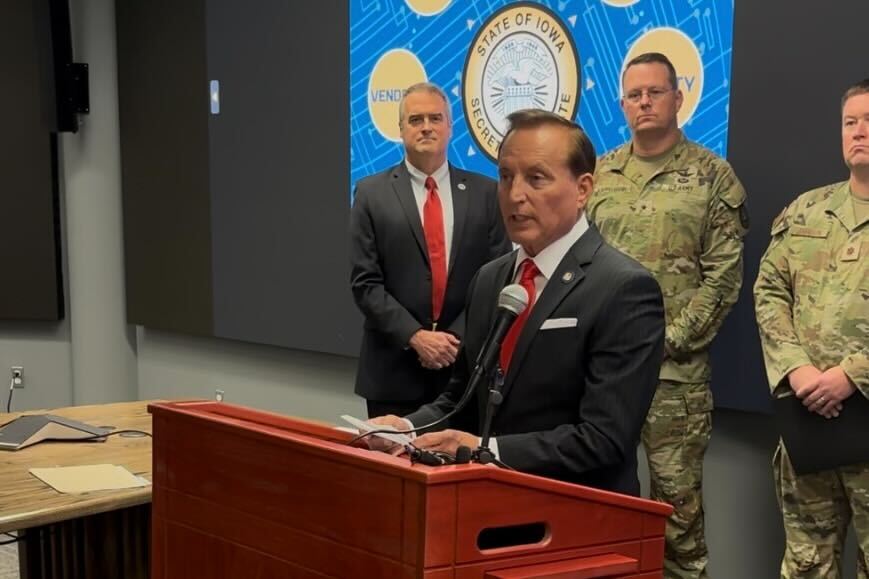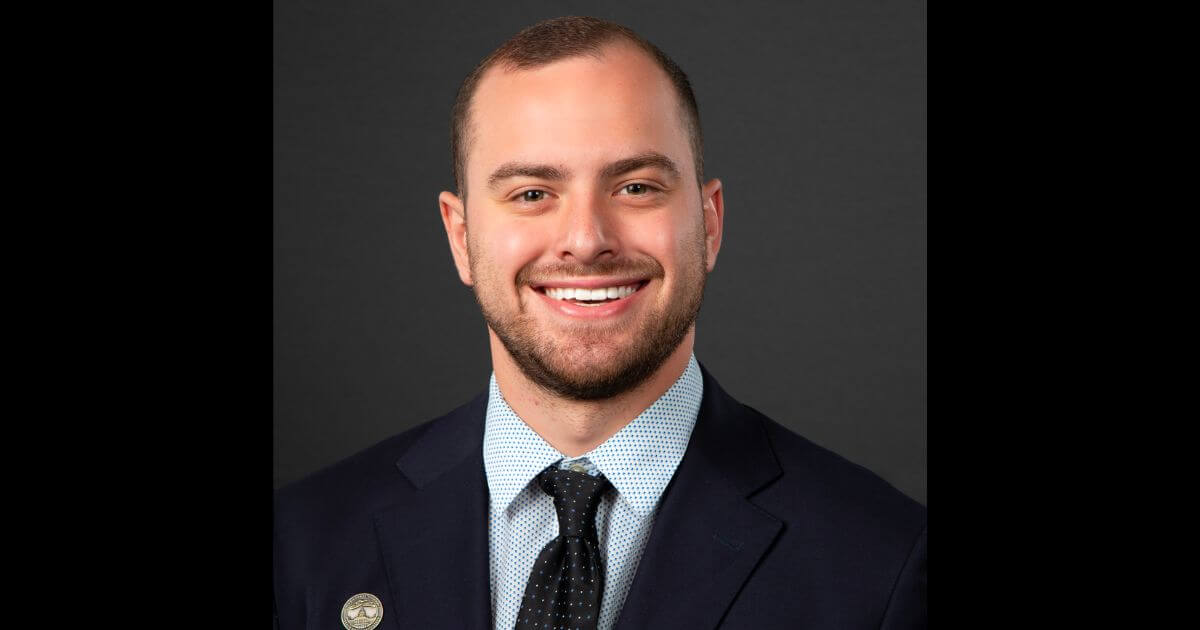
Photos by Starting Line staff
Despite both of her parents being college graduates, Esther Hurston said her family struggled financially for most of her childhood and those scars stick with her.
“As a little girl, I never knew if we were going to have a home to live in, if I was going to have food to eat,” she said. “I didn’t have health insurance or dental insurance and I still deal with those ramifications to this day.
“It’s part of the reason I became a nurse, because I thought, what could I do to use my experiences to help others.”
Hurston shared this story with Iowa lawmakers and dozens of strangers at the Iowa Capitol and hundreds more tuning in online during a Tuesday Iowa House public hearing on SF 494, which would take food and health care assistance and other benefits away from thousands of Iowans.
Hurston, who works for the Iowa Nurses Coalition, spoke against the bill and used her personal history as an example.
SF 494 forces Iowans who already qualify for SNAP, Medicaid, and other forms of public assistance to jump through additional hoops, including new identity verification and asset testing requirements.
According to the nonpartisan Iowa Legislative Services Agency (LSA), it would cost about $7.5 million over two years to implement SF 494, which is about four times what it cost annually to currently administer SNAP benefits. It would also require the Iowa Department of Health and Human Services to hire 219 full-time employees by 2026 to administer.
The LSA also notes that 8,000 Iowans would lose their Medicaid benefits and 2,800 would lose their SNAP benefits under SF 494. The eventual state-level cost savings come from taking food and health care away from people and the federal dollars that fund the programs go away.
During the hour-long hearing, Hurston was one of 46 people who signed up to speak against the bill, and there were 19 who signed up to speak in favor of the legislation including several business owners, two pastors, and a handful of private citizens.
Rep. Fry is having speakers alternate pro and con.
First two pros were business owners, first two cons were food bank employees.
Fifth speaker was a pastor from Perry who favored the bill because it creates accountability: https://t.co/VA1GBaSNxv pic.twitter.com/AiTnIcqOJS
— Ty Rushing (@Rushthewriter) April 4, 2023
Some of those opposed to the legislation included Briana Jenkins, a single mom from Ankney. Jenkins said she uses SNAP benefits to purchase food and buy her infant daughter’s “expensive” baby formula.
“Eating is not a necessity, it’s a must,” Jenkins said.
[inline-ad id=0]
While she was registered in favor of the bill, Monica Janelle of Ankeny spoke against it. Janelle is a real estate agent and married mother of three sons, two of whom are diagnosed with autism.
Janelle said her family spent eight years on the waitlist for the IA Home and Community Based Services – Intellectual Disabilities (ID) Waiver, which provides a wide range of services to Iowans who have intellectual disabilities through Medicaid. The proposed changes under SF 494 would disqualify her sons who have autism from receiving those ID services.
“Both boys attend a comprehensive transition program sponsored by the University of Iowa and also work part-time during the summer, so you may ask why they need to be on this Medicaid ID waiver,” Janelle said.
“Here’s why, the Medicaid waiver provides many services: job training, independent living, socialization, transportation, and other opportunities. Without this waiver, they would not be able to access services that would help them learn to live independently and work in the community of their choosing,” she continued. “If they are not able to move to full-time employment with health benefits, Medicaid will continue to be the only choice available to them in health care because of their disabilities.”
Darla Chappell of St. Donatus, a small town in eastern Iowa, spoke in favor of the bill. She said this will stop abuse in the program and ensures funds from “hard-working Iowans” are spent wisely. Chappell said the proposal would make sure people who receive SNAP benefits aren’t collecting from more than one state and to back this claim, she said during her time working in a bank she saw this happen when people came to cash checks.
SNAP benefits aren’t distributed as cash or check. They come on a preloaded card that can only be used to purchase “any food to be eaten at home by people, including baby food, non-alcoholic beverages, and seasonings. Seeds and plants to grow food for your own family’s consumption.”
Chappell also argued that this bill would stop people with hidden assets from using the program.
“Why should someone with benefits not try to help themselves first by the sale of luxury items such as an expensive second car, boats, RVs, or vacation properties,” Chappell said.
The existing 16-page Iowa SNAP application asks about those specific items. Legal punishments for violating the rules of the program include up to 20 years in jail and up to $250,000 in fines, and there could be additional state and federal charges.
Additionally, fraud is already rare in Iowa’s Medicaid and SNAP programs.
A little less than 900,000 people are enrolled in Iowa’s Medicaid program. Iowa’s Medicaid Fraud Control Unit only had 287 open fraud causes, according to its latest fiscal year report. Of those 287 cases, 230 were multi-state civil cases and 57 were in-state civil fraud cases.
For SNAP benefits, Iowa disqualified 322 out of 305,045 people and convicted just four people of fraud during the 2020 fiscal year. That’s a fraud rate of one-thousandth of one percent.
After the hearing, Rep. Heather Matson (D-Ankeny) shared what she observed from listening to Iowans who spoke about the bill.
“What I heard over and over again is that families are struggling and what this bill is going to do is make it even hard to put food on the table for kids, for folks who are disabled, and for the elderly and that is absolutely the last thing we should be doing right now especially as food pantry use is on the rise across the state and that is something else we heard over and over again,” Matson said.
“We also heard from a couple of folks who were in favor of the bill, but, honestly, a couple of those points weren’t completely grounded in what is actually in the bill.”
Hurston, the Iowa nurse, had an even more direct assessment of SF 494 during her remarks.
“This is not good for the health of Iowans,” she said.
by Ty Rushing
04/06/23
[inline-ad id=”0″]
If you enjoy stories like these, make sure to sign up for Iowa Starting Line’s main newsletter and/or our working class-focused Worker’s Almanac newsletter.
To contact Senior Editor Ty Rushing for tips or story ideas, email him at [email protected] or find him on social media @Rushthewriter.
Iowa Starting Line is part of an independent news network and focuses on how state and national decisions impact Iowans’ daily lives. We rely on your financial support to keep our stories free for all to read. You can contribute to us here. Also follow us on Facebook and Twitter.

Iowa’s use of flawed data in voter challenges results in confusion, lawsuit
Despite known issues with driver’s license records, the Iowa Secretary of State's voter challenges targeted 2,022 registered voters—including...

Miller-Meeks contorts herself on Trump and Hunter Biden convictions
Republican Iowa congresswoman agrees with Hunter Biden’s conviction, but minutes later, she said she has “great concerns” about Donald Trump's...

Orient-Macksburg officials move forward with plan to close Iowa school district
Orient-Macksburg School Board approves the resolution to dissolve, but voters will make the final decision. Silence filled the room after...

Big corporations are suing to block Biden’s efforts to lower costs
From the cost of medication to education to everyday expenses, the Biden administration has passed several laws and implemented many federal rules...

Lanon Baccam wins 3rd District Dem primary, will face Zach Nunn
Baccam defeats Melissa Vine to challenge Republican incumbent Lanon Baccam defeated Melissa Vine in Tuesday’s Democratic primary for Iowa’s 3rd...

Hardin County man running for office as Trump-loving Democrat to local party’s dismay
Brad Rewoldt, who recently changed his party affiliation from Republican, says his support of Trump will probably 'piss off' Democrats There is a...







